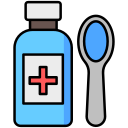
Adryl
Form: Syrup
Strength: 10mg/5ml
Generic Name: Diphenhydramine Hydrochloride
Company: Square Pharmaceuticals Ltd.
MRP:৳ 45.0 (100ml bot)
Is Antibiotic: No
Indications
Adryl is used to treat allergic conditions such as hay fever, allergic rhinitis, hives, swelling, eczema, contact dermatitis, food allergies, itching, physical allergies, reactions to contrast media injections, reactions to medicines, and allergic transfusion reactions. Adryl also helps treat nausea and vomiting after surgery, motion sickness, certain types of Parkinson’s disease, and allergic eye conditions. Adryl may also be used as a sleep aid for short-term insomnia.
Pharmacology
Diphenhydramine works by blocking histamine (H1-receptor), preventing allergic reactions like swelling and congestion. Adryl helps reduce nausea by acting on the brain’s vomiting center. Adryl also helps with dizziness and motion sickness by affecting the balance center in the brain.
Dosage & Administration
Antihistamine and antitussive:
Tablet:
Adults: 25 mg to 50 mg, 3 to 4 times daily.
Children (10 years or over): 25 mg, 3 or 4 times daily or as directed by the doctor.
Syrup:
Children under 2 years: 2.5 mL every 4 to 6 hours.
Children 2 to under 6 years: 5 mL every 4 to 6 hours.
Children 6 to 12 years: 10-20 mL every 4 to 6 hours.
Adults and children ≥12 years: 10-20 mL every 4 to 6 hours.
Sleep aid:
Adults and children over 12 years: 50 mg at bedtime.
Interaction
Diphenhydramine may interact with antidepressants, especially tricyclic and monoamine oxidase inhibitors (MAO inhibitors), which can increase its side effects. Alcohol and other sedative drugs can make the CNS effects stronger.
Contraindications
Adryl is contraindicated in premature or newborn infants, anyone allergic to any component of this drug, people having asthma attacks, narrow-angle glaucoma, enlarged prostate, peptic ulcers, or obstructions in the stomach or bladder. Adryl should also not be used with patients taking antidepressants.
Side Effects
Side effects may include drowsiness, dizziness, dry mouth, nausea, and vomiting. Other effects that are less common are dizziness, heart palpitations, blurry vision, headaches, restlessness, trouble sleeping, and thickened mucus in the airways. Allergic reactions, diarrhea, and agitation may also occur.
Pregnancy & Lactation
Its safety during pregnancy and breastfeeding has not been fully studied. Adryl should only be used during pregnancy if the doctor decides the benefits outweigh the risks. Caution should be used when breastfeeding, as the drug can pass into breast milk.
Precautions & Warnings
Patients should be careful not to drive or operate heavy machinery until they know how the drug affects them.
Overdose Effects
Overdosing on antihistamines can cause either CNS depression or stimulation, especially in children. Symptoms of overdose may include dry mouth, enlarged pupils, flushing, and stomach problems.
Therapeutic Class
Sedating Antihistamine
Storage Conditions
Store below 30°C. Keep away from light and moisture. Keep out of the reach of children.
Similar Brands of Diphenhydramine Hydrochloride (Syrup – 10mg/5ml)
| Brand Name | Form | Strength | Company | MRP (৳) |
|---|---|---|---|---|
| Difin | Syrup | 10mg/5ml | Nipa Pharmaceuticals Ltd. | 40.0 |
| Dorenta | Syrup | 10mg/5ml | Eskayef Pharmaceuticals Ltd. | 42.0 |
| Pedeamin | Syrup | 10mg/5ml | Beximco Pharmaceuticals Ltd. | 45.0 |
| Pedilar | Syrup | 10mg/5ml | Popular Pharmaceuticals Ltd. | 45.17 |
| Pediphen | Syrup | 10mg/5ml | Somatec Pharmaceuticals Ltd. | 38.0 |
| Pedryl | Syrup | 10mg/5ml | Oyster Pharmaceuticals Ltd. | 20.0 |
| Phenadryl | Syrup | 10mg/5ml | The ACME Laboratories Ltd. | 45.0 |
| Phendrin | Syrup | 10mg/5ml | Salton Pharmaceuticals Ltd. | 22.08 |
| Rymin | Syrup | 10mg/5ml | Opsonin Pharma Limited | 45.0 |